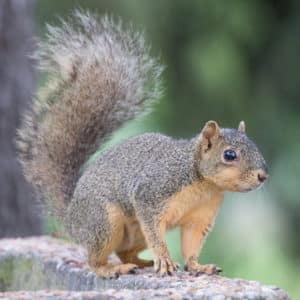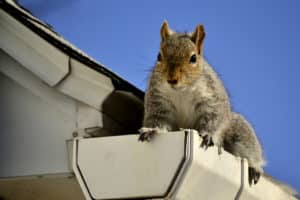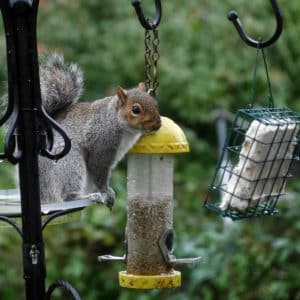Urban Squirrels
There are five species of native squirrel in the Portland-Vancouver metro area: the Western Gray Squirrel, Douglas Squirrel, California Ground Squirrel, Townsend’s Chipmunk and the Northern Flying Squirrel.
Western Gray Squirrels were once the most common squirrel species in the Portland area but have now almost completely disappeared due to development and competition from non-native species. Today our two most common urban squirrels, the Fox and Eastern Gray, are non-native, invasive species from the east coast.
Non-native Squirrels
Fox Squirrels were brought to Oregon from the eastern United States and have established themselves in urban and suburban habitat through the state. They are the most common tree squirrels found in Portland and have contributed to the decline of native squirrel species.
Fox Squirrels are reddish brown in color with large bushy tails and tan undersides. Oregon’s Fox Squirrels are notorious for breeding “out of season,” and infant and very young squirrels found later than Oct. 1 and earlier that April 1 are typically members of this species.
Eastern Gray Squirrels are small gray-and-brown squirrels with a white belly that were introduced to Oregon and Washington from the eastern United States. They are smaller than the native Western Gray Squirrel.

Wildlife Care Center Non-Native Squirrel Policy
Bird Alliance of Oregon’s Wildlife Care Center does not accept non-native animals for treatment. This includes Fox and Eastern Gray Squirrels, both of which are non-native animals introduced to the Pacific Northwest from the eastern United States. For the full policy, visit our Non-native, Domestic, and Exotic Species page.
Introduced species compete with and reduce the numbers of native wildlife. Injured and orphaned non-native squirrels left at the Wildlife Care Center will be humanely euthanized.
Common Situations
Squirrels in attics, chimneys, basements and crawlspaces
Squirrels will take advantage of accessible attics, chimneys, basements and crawlspaces both to raise young and escape the winter cold. Many problems can be avoided by sealing entryways before squirrels take up residence. Half-inch mesh is effective for preventing squirrel entry.
If a squirrel does take up residence in your home, it is important to determine whether she is raising young before attempting removal. Please remember that the squirrel breeding season in Portland can begin as early as February and extend all the way to November. If you determine the squirrel is raising young, it is best to wait until the young are able to fend for themselves before attempting removal. If you must remove squirrels sooner, use one of the repellent methods listed below that will allow squirrels the opportunity to leave on their own and take their young with them.

There are several methods for removing squirrels from homes:
- Use a non-lethal repellent to deter squirrels from taking up residence in certain areas of your home. These can be bought at local feed, home, and garden stores.
- Place a radio set to a talk station in close proximity to the denning area. This is also an effective method for causing a squirrel to leave.
- Use a live trap, but only in cases where the squirrel has been determined not to have young. Trapped squirrels should be released back into the same neighborhood after entry holes into your home have been sealed.
- A one-way door can be made very simply or purchased commercially, and acts as a door that allows the squirrels to exit the attic but not get back in. This lets you make sure all squirrels have left the interior and then permanently block the entrance. One-way doors can be built cheaply with items at your local hardware store: Fasten a double layer of hardware cloth or wire mesh to the top of the entrance. Allow the cloth to drop shut flush.
- Once squirrels have been removed, all access points must be covered with hardware cloth or squirrels will quickly regain entrance. No method will ultimately be successful unless you determine how squirrels are accessing your home.
Relocation of squirrels
Bird Alliance of Oregon generally opposes the relocation of wildlife as a solution to human-wildlife conflict situations. In the case of squirrels, relocation is usually only a temporary solution, as the relocated animal will quickly be replaced by another of the same species.
Relocation of squirrels has contributed to the proliferation of non-native species into new habitat. It is also important to note that different squirrel species have very different habitat needs. For example, the Fox and Eastern Gray Squirrels that do very well in our urban and suburban neighborhoods cannot survive in the dense forest of Forest Park.
Finally, squirrels are territorial. Squirrels relocated into new habitat will inevitably have to fight with squirrels that are already established in that location. It is far better to look for local solutions when conflicts between humans and squirrels arise. More information on relocation of wildlife.
Squirrels and bird feeders
Squirrels are incredibly agile and persistent when it comes to raiding bird feeders. Unfortunately, there is no one-size-fits-all method for preventing squirrels at you feeders.
Deliberate feeding of squirrels is not recommended as they can quickly become habituated to human handouts. Wild animals that lose their instinctive fear of humans are more likely to become pests and incur injuries.
The key to discouraging squirrels from your feeder is to be inventive. Find out how the squirrels are accessing your feeders and work from there. There are several commercial products available to try to limit squirrel access, such as specially designed caged bird feeders, weight-triggered trap door feeders and baffles to place above or under feeders. Hang feeders away from easy access points such as tree limbs and fence posts.

Squirrels losing their fur
Hair loss in squirrels is generally a sign of mange, a naturally occurring microscopic mite that causes hair loss and scabbed skin. Mange is often a secondary problem that afflicts squirrels that are already debilitated or in poor health.
If you see a squirrel with possible mange, it is best to leave the squirrel alone and allow nature to take its course. Some squirrels will recover on their own while others will eventually succumb.
In order to reduce transmission between squirrels, it is also helpful to remove bird feeders where squirrels congregate. We recommend feeders be taken down for a period of at least two weeks. Free-roaming squirrels with mange do not pose a risk to either humans or domestic pets.
Squirrels as pets
Squirrels do not make good pets. They can be destructive and have expensive and unique medical, care and housing needs that are difficult to accommodate in a captive situation.
They can carry diseases that are transmissible to both humans and pets, especially when long-term, close contact occurs.
Finally, squirrels become territorial and aggressive when they reach sexual maturity (six months to one year of age). They can become a danger to their captors and especially to unfamiliar visitors. These animals are also typically not suitable for release into the wild since they frequently approach and behave aggressively toward humans after release.
Injured and orphaned squirrels
Injured squirrels may be brought to the Wildlife Care Center from 9 a.m. until 5 p.m., seven days a week. When capturing and transporting injured squirrels, it is important to remember squirrels can bite, scratch and transmit disease to humans. Refer to our Wildlife Rescue Tips page for more on what to do with an injured animal.
Young squirrels that are found alone may or may not need help. In many cases, young squirrels can be reunited with their mother fairly easily. Check out our “Found a Baby Mammal?” page for more information on reuniting.
The Wildlife Care Center does not provide treatment for non-native squirrel species. Injured and orphaned non-native squirrels brought to the care center will be humanely euthanized. For the full policy, visit our Non-Native, Domestic, and Exotic Species Policy page.
Squirrels from Washington
We are not allowed to accept any mammals from outside the state of Oregon. Any Washington mammals should be referred to Washington Department of Fish and Wildlife.
